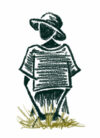 People
People
A Storied Farmer
The fruits of Rose Robson's labors are on display at orchards in Burlington County where uncommon varieties reveal her prowess not only at growing, but educating an increasingly curious public.
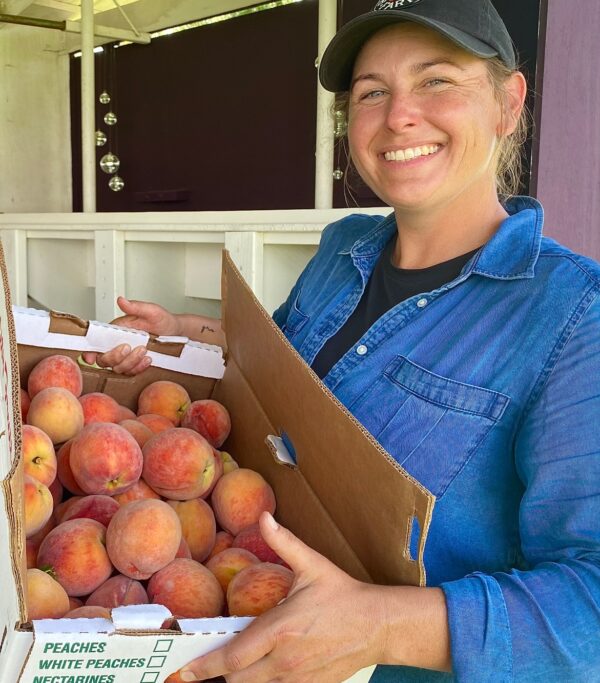
Once upon a time, on a farm in Burlington County, not all that far from any place in New Jersey, a little girl was growing up on 1,200 acres of land where all kinds of plants sprouting all kinds of good things to eat made her home a wonderland of foods much fresher than anything found at a supermarket.
She grew strong in a lot of ways. But even after she left the farm to study journalism at the University of South Carolina, she didn’t forget her literal and figurative roots. In fact, during her senior year, wanting to see locally grown and raised foods be an integral part of her university’s dining hall menus, she chose as her personal project to focus on South Carolina’s Department of Agriculture: She would develop a Fresh Menu program that would mean at least 25 percent of all ingredients used to make the foods on her college’s dining menus had to be grown and raised locally. She achieved that goal, all by herself.
After she graduated, she made her way into the world, working in South Carolina’s capital and Chicago in big jobs, important jobs. But a not-so-funny-thing happened in those big cities: The young woman found herself bored. She wanted to go back home, to North Hanover Township, a veritable Hail Mary forward pass from McGuire Air Force Base, and farm once again.
The land, and the life of a farmer, was calling Rose Robson.
*
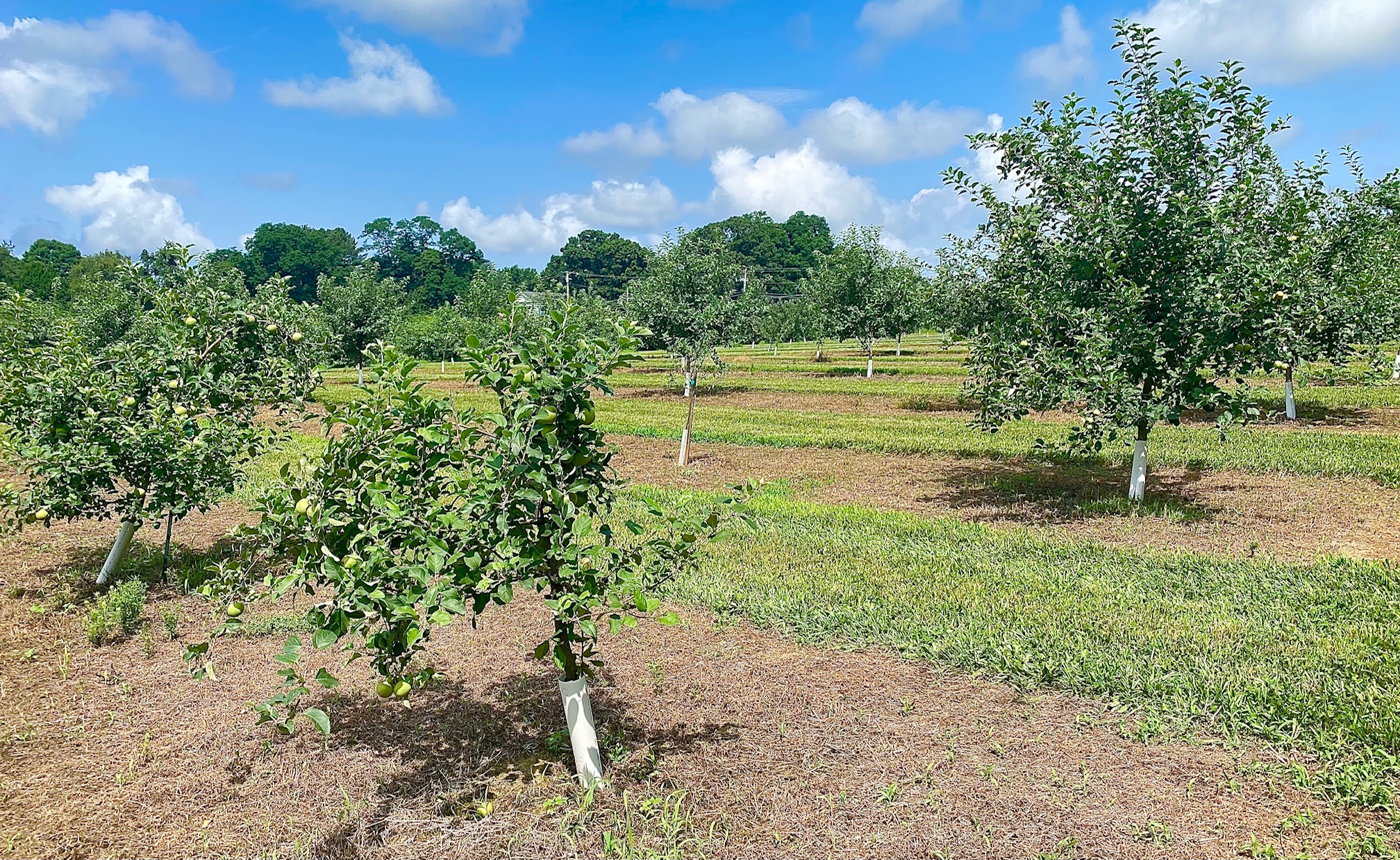
Actually, much more always calls Rose Robson, who now at Robson’s Farm shepherds one of the Garden State’s most eclectic collections of apple, peach and nectarine varieties as well as burgeoning orchards of pawpaws, the new darling of the culinarily curious. Robson has been back on the farm for 12 seasons now, working on a smaller, more focused scale, and developing a reputation for peak quality and beyond-standard-issue fruit types that draw huge crowds to special events, you-pick days and the purple farmstand where the farmer often can be found teaching.
Education for all ages always will be Rose Robson’s goal. It’s one of the reasons why she’s written three children’s books and absolutely why folks buy them – for the kids in their lives and to learn a thing or five themselves.
“I always wanted to write,” Robson says. Just as she’s always had to farm.
In 2021, a year into Covid, she found herself cleaning out stuff.
“I found some notes I’d written in 2012,” she says, including “a goal sheet” from the time she was living and working in a big city. On the goal sheet, Robson had instructed herself to “write a book.”
Now, mind you, by this time, Robson had been back on the farm for about nine years. While she’d been gone, much had changed.
“While I was in college, both my dad and my grandfather passed away,” she says. Her father Neil Robson had followed his father Art Robson Jr. onto the land, who’d followed his own dad Art Robson Sr. into farming. Robsons today are circling the century mark of farming in North Hanover Township. “My mom” – Jean – “kept 40 acres” in active Robson farming, but sold off a lot of the rest to another local farm family, the Byrnes.
But when that call came, Rose Robson notes, “my mom let me come back and farm.”
She didn’t then – and doesn’t now – do what a number of other farms do, which is offer hayrides and entertainment to attract visitors and customers.
“It’s you-pick over hayrides,” she says, “and we’ve found there’s a huge demand from people who want to come here to enjoy a farm without those extras.”
Although there is entertainment to take home, in the form of those three Rose Robson books: “Beach Peach,” “Flower Power,” and “Sloan McGloan and the UFP,” to be read before, during and after consuming, say, a donut peach, a super-size Loring peach, a Mountain Rose apple, or a creamy pawpaw.
*
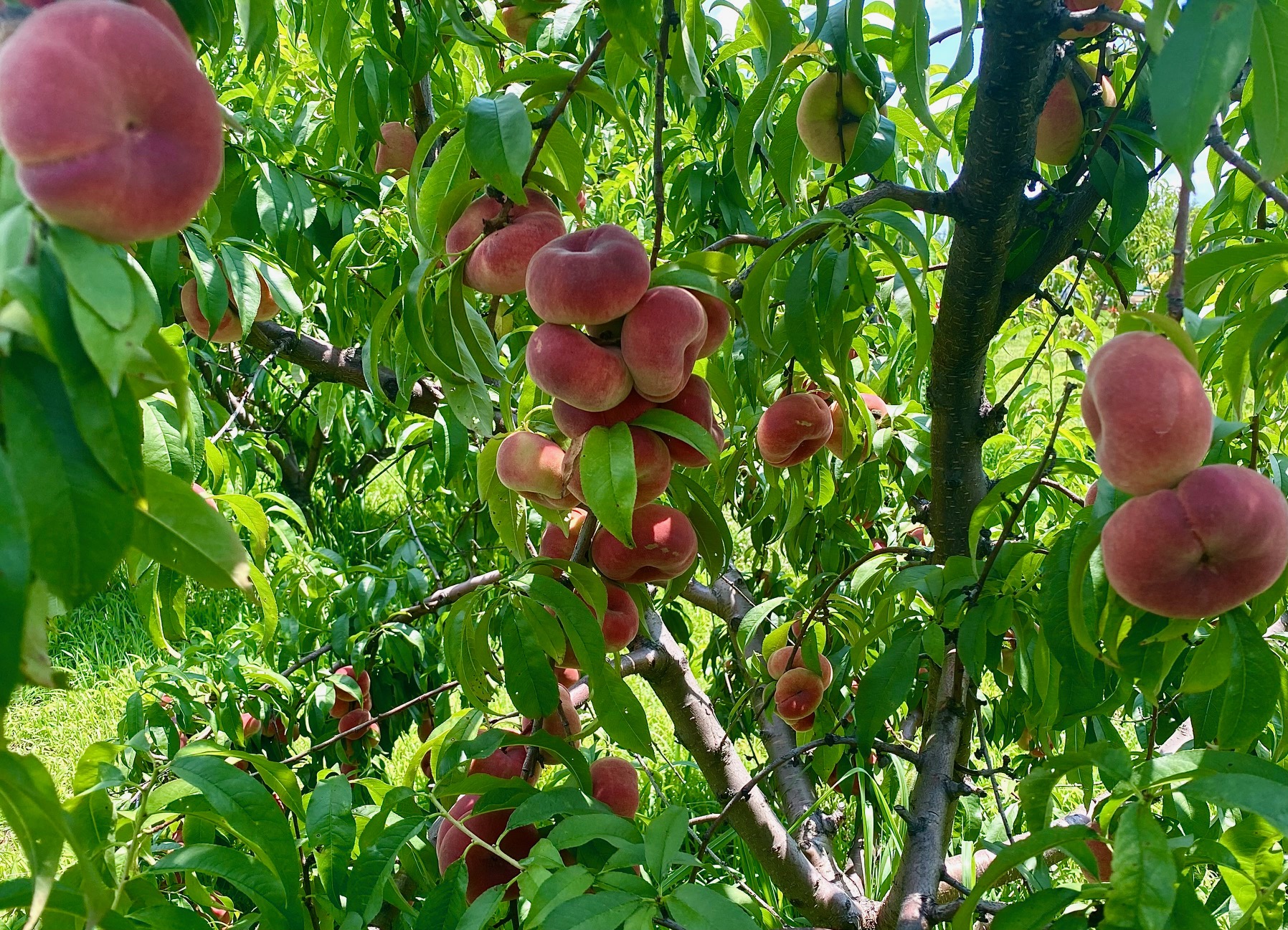
Right now, Robson’s Farm is in the middle of Donut Peach Week, which started Thursday and continues through tomorrow (July 20). Robson likes to spotlight peak-season fruits and bring their defining qualities to the public’s attention.
Donut peaches, smaller and flatter than regular peaches, are very low in acid, quite sweet and possessing little or no fuzz. Give their centers a poke and the small pit may fly right out. In fact, they look to some like …
“A space ship,” Robson says, launching into a tale of how her newest book, “Sloan McGloan and the UFP” – a.k.a. Unidentified Flying Peach – came into being.
Motivation understandable, especially when confronted by the some of the names of donut peach varieties: Saturn, Galaxy, Orion and Galactica, plus BuenOs and TangOs (for those who recall actual astronauts’ in-space drink of Tang).
When Robson holds Donut Peach Week, folks come from afar. “People will buy, maybe, $400 worth of donut peaches,” she says. Though initially, Donut Peach Week was an event she devised to “fill a gap among yellow peach harvests,” people have fallen so in love with the easy-eating smaller peach that it’s now a popularity contest winner among customers.
Another big-ticket event is Loring Peach Week, which occurs in mid-August. “It’s the biggest peach variety we grow,” Robson says. Sentry peaches are an early variety, while Victoria peaches “are about the latest variety you can grown in this area.” This year will mark Robson’s first harvest of the Victorias, anticipated to be ripe and ready in mid-September.
Peaches eventually segue into pawpaws and apples, with pawpaws picked in September and apples peaking in October. Robson’s Farm is known for uncommon varieties of apples, specifically red-fleshed apples, such as the Lucy Glo, yellow outside and red-orange inside, and the Lucy Rose, blush-red outside and inside. Also in Robson’s orchards are Arkansas Black apples (“such a good apple and you can keep them in your refrigerator till March and it’ll still be super crisp”); Pink Pearl, another popular red-fleshed variety; and Mountain Rose, a pink-fleshed type “that’s small, tart and crisp, and greenish on the outside.”
All will have their moments in the spotlight at Robson’s Farm.
*
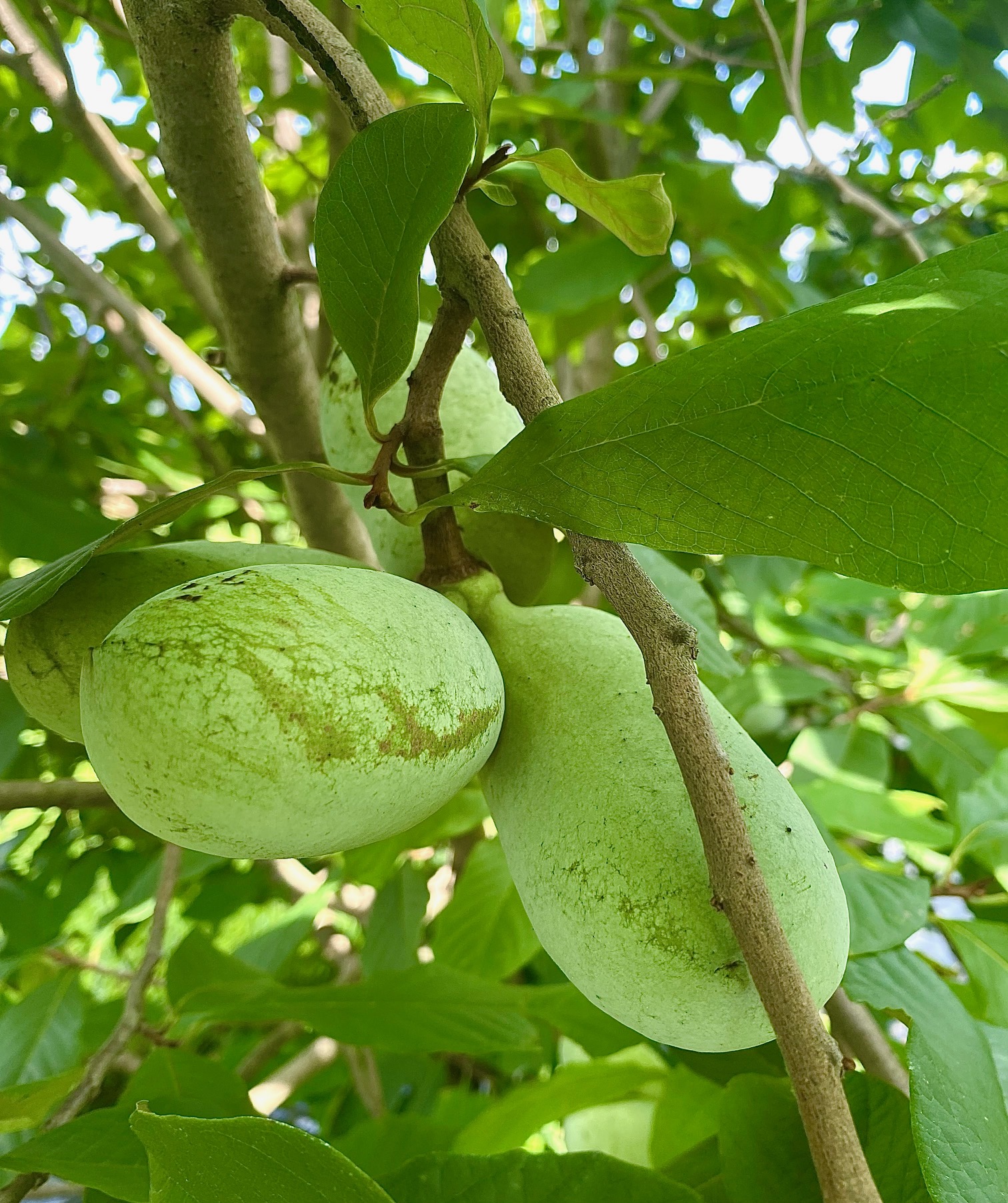
Rose Robson is gliding about her orchards, pointing out particularly winsome clusters of pawpaws on her trees. The oldest are 11 years, with new trees planted routinely to continue high-quality crops and harvests. A pawpaw isn’t a supermarket fruit; its shelf life isn’t long enough to withstand a cycle of sitting, shipping, storage and, finally, placement for consumer procurement. But its creamy, pudding-like texture and mild, tropical-banana-esque taste keep pawpaws in demand. There’s got to be a pawpaw book in the farmer-author’s future, yes?
Robson’s thinking on this.
“What is a pawpaw? How do you eat pawpaws?” she says, wonder in her voice. “And other fruits (most people) don’t know enough about.” She’s thinking about growing rhubarb and persimmon. While there are 40 acres growing now, there’s more acreage on the farm that Robson can work with. A current project is constructing a 40-foot-by-100-foot building that will be “part farm stand, part storage and garage, and an apartment I’m going to live in, all on one floor.”
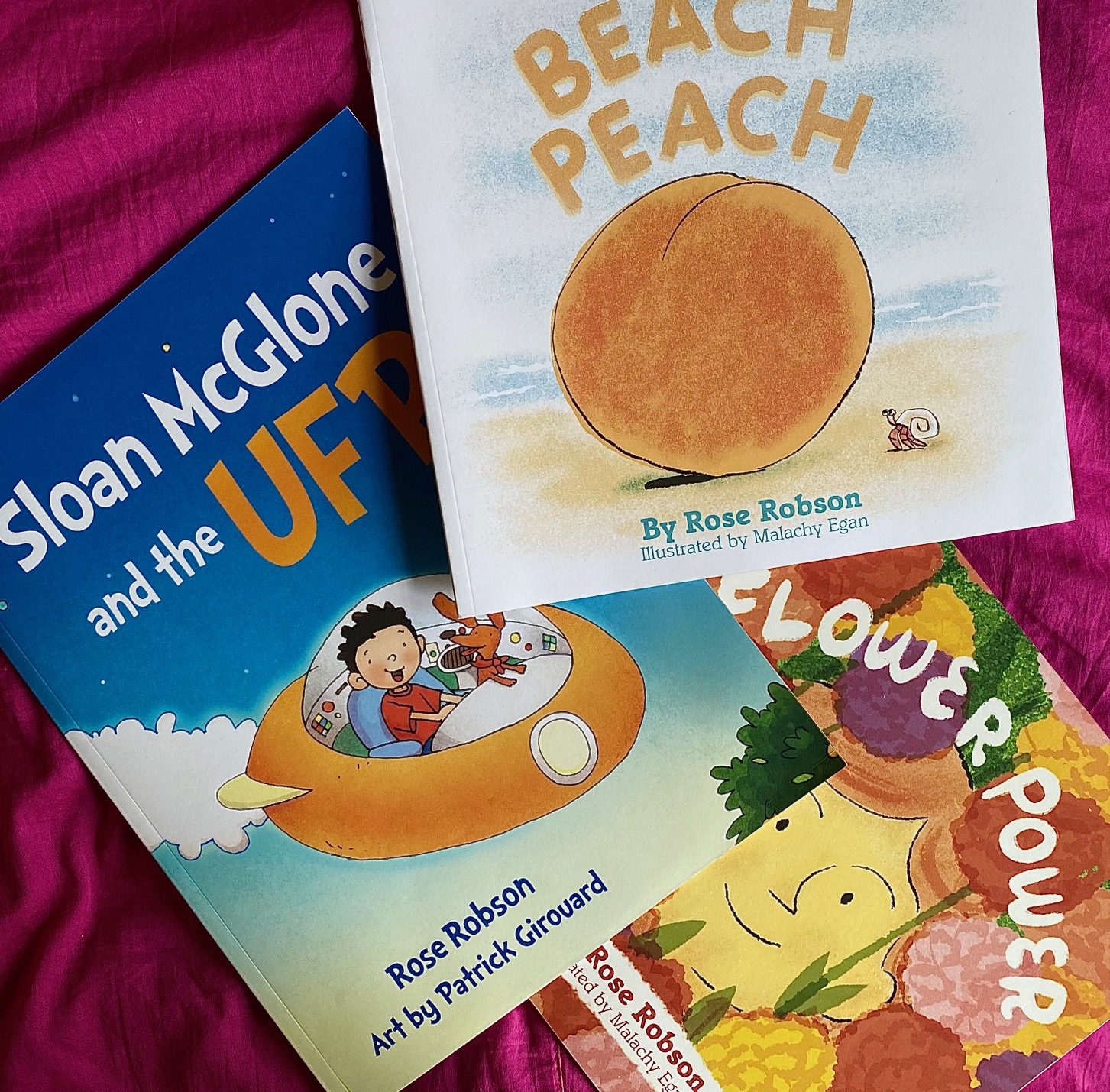 If it seems as though Rose Robson sits in front of an awfully large plate that’s overflowing, what with running a farm, marketing and staging regular events, writing books and building out major components to keep Robson’s percolating, she reveals an inscrutable fact: She works a full-time job in an affiliated industry. That’s something many farm owners understand, as the ends don’t often meet and supplemental income is needed to support the operation of a farm.
If it seems as though Rose Robson sits in front of an awfully large plate that’s overflowing, what with running a farm, marketing and staging regular events, writing books and building out major components to keep Robson’s percolating, she reveals an inscrutable fact: She works a full-time job in an affiliated industry. That’s something many farm owners understand, as the ends don’t often meet and supplemental income is needed to support the operation of a farm.
She accepts this and talks about her book teams, including her beloved editor Amy Betz, who told Robson after reading the initial draft of the remarkably instructive “Beach Peach” book that “this story needs to be about the peach as much as the beach.” Read it – it ends with a recipe for “Grandma’s Peach Cobbler” – and learn exactly when this fruit is just-right ripe “so that peach can live up to the hype.”
Which is the mission behind Robson’s Farm and the moral of Rose Robson’s story.
ROBSON’S FARM, 33 Rahailly Road, North Hanover Township (GPS may use Wrightstown). Website: www.robsonsfarmnj.com. Follow on Facebook and Instagram @RobsonsFarm. The famous purple farm stand is open Thursdays and Fridays from 10 a.m. to 6 p.m. and on Saturdays and Sundays from 10 a.m. to 4 p.m.